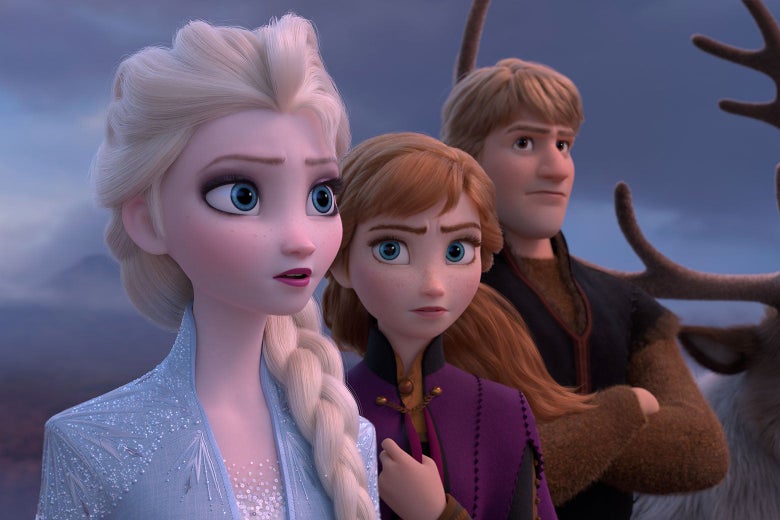
Elsa, Anna, and Kristoff in Frozen 2.
© 2019 Disney
Zeitgeist-defining movies have a way of reshaping reality so that what was distinctive about them becomes too familiar to even notice. It takes effort to appreciate how unusual it was for Star Wars to treat spaceships like rusty jalopies, that E.T. shoehorns in a prolonged homage to The Quiet Man. Six years ago, Frozen was a lumpy if charming fairy tale that bore the marks of its prolonged development process, a musical that abandons music for most of its final act, a story that turned itself inside out to provide a villain when its central figure was changed from frosty antagonist to misunderstood outcast.
A million viewings later, none of that matters. Frozen isn’t a movie you compare to other movies. It’s a movie you compare other movies to, a baseline, a first principle. That makes the task of crafting a sequel to it especially daunting, one that returning writer-directors Jennifer Lee and Chris Buck have coped with largely by not doing that. Frozen 2 hits all the expected beats, so much so that it feels as if you could overlay it on top of the original and watch the moments line up: an opening childhood flashback, then an establishing scene in present-day Arendelle, then Anna (Kristen Bell) and Elsa (Idina Menzel) flee their kingdom in the name of protecting it, then Olaf the snowman (Josh Gad) cracks jokes, then Elsa belts out a ballad in an icy enclosure during which her wardrobe gets a magical upgrade, then Olaf fantasizes about an alternate existence. (There is a lot of Olaf.) But where its predecessor had moments of surprising, almost alarming emotional depth, the new movie skims along the surface, putting its heroes in physical peril but never endangering their hearts. Frozen 2’s “Let It Go” is no “Let It Go.”
The story begins with Anna and Elsa’s mother, voiced by Evan Rachel Wood, singing to her daughters about a mystic river at the end of the world whose waters contain all the secrets of the past. Arendelle’s past soon becomes very much at issue after the town is threatened with destruction by the restless spirits of the earth’s four elements, and it emerges that the kingdom has unfinished business with the Northuldra, the native people who inhabit the mountains above the palace. That the movie concerns tension between the Scandinavian-looking people of Arendelle and their almond-eyed, buckskin-wearing (don’t tell Sven) indigenous neighbors ought to give the movie plenty to work with, but it’s got little to do with the underpinnings of Frozen, which is about the cost of emotional repression and not the historical misdeeds of colonialism. There’s a lot at stake for Arendelle—its very existence, among other things—but almost nothing for the movie’s ostensible protagonists.
There is a lot of Olaf.
Frozen 2 also retains the Oscar-winning composing team of Robert Lopez and Kristen Anderson-Lopez, but whether it’s lack of inspiration or simple repetition, the movie’s songs largely come off as a collection of musical tics, the equivalent of a meal thrown together with whatever’s in the fridge. As delightful as “Lost in the Woods,” an ’80s-style power ballad sung by Jonathan Groff’s Kristoff is, it’s not a great sign that it’s the best thing in the movie, especially since younger viewers will be blind to the scene’s canny riffs on karaoke-machine visuals. (You can pinpoint the adults in the audience by who snickers when an autumn leaf lands delicately on a pond and the image ripples away.) Menzel still belts, Bell still brings her plucky charm, and Gad still makes children roar and sets their parents’ teeth on edge.
But it feels like a movie into which Frozen’s characters have been dropped rather than one that was built around them, and it’s especially odd in the wake of Moana and the remade Lion King to put these particular characters at the center of a story that ends up touching none too subtly on the issue of reparations. Frozen 2 doesn’t have its forebear’s ungainliness; in many ways, it’s more efficiently engineered. But it’s also far less surprising, even taking into account that a sequel’s first task is to give people what they expect. Frozen was built around an anthem to letting your emotions take control because no matter how flawed the results might be, it was preferable to sterile perfection. Maybe the people who made the new movie should watch it again.
from Slate Magazine https://ift.tt/2O4EURn
via IFTTT
沒有留言:
張貼留言